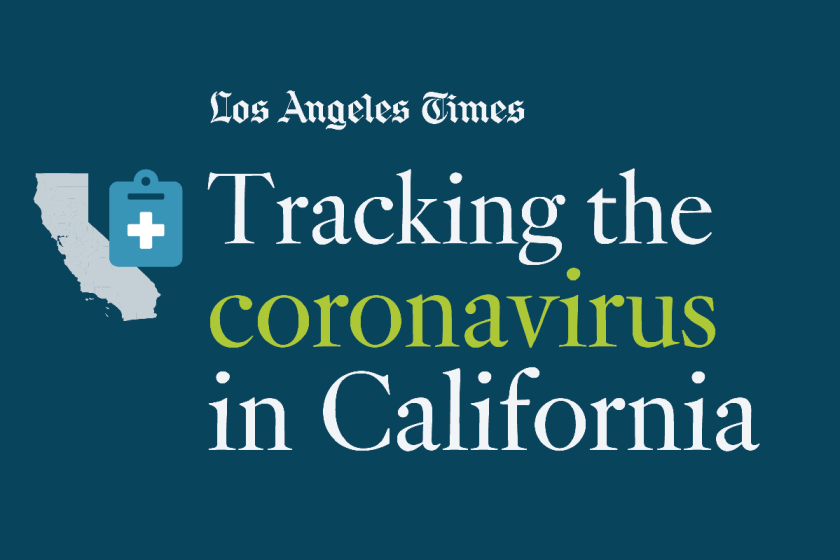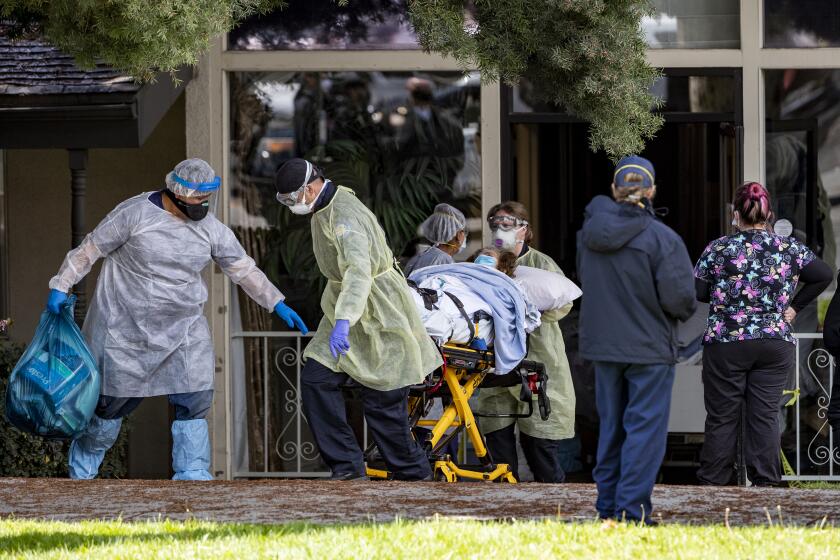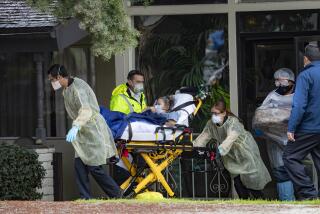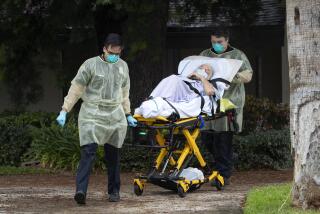Nursing homes want to be held harmless for death toll. Here’s why Newsom may help them
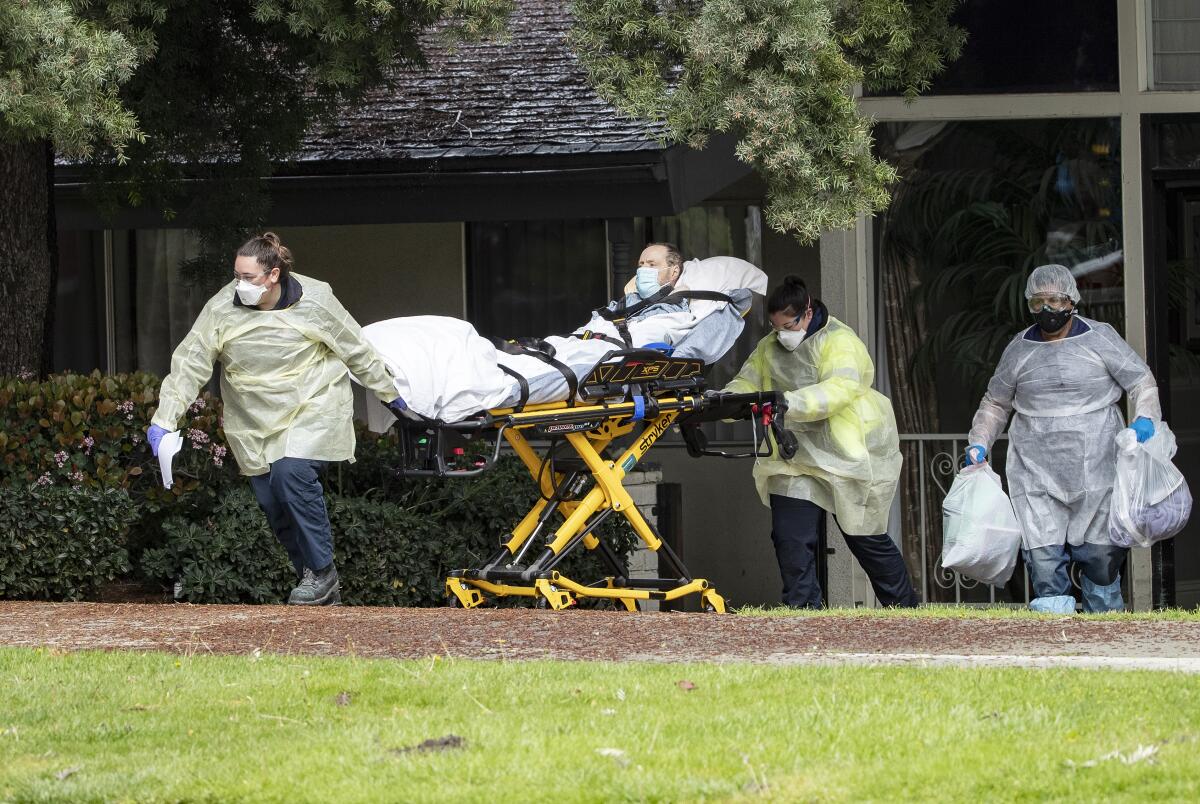
For weeks, nursing homes have been the epicenter of coronavirus outbreaks and deaths in California, making them prime targets for civil lawsuits and even criminal prosecutions.
But the nursing home industry has some leverage to fend off legal action: California needs these nursing homes to relieve pressure on hospitals statewide.
Well aware of that reality, the healthcare industry has been lobbying Gov. Gavin Newsom to sign a sweeping order it has drafted that would shield nursing homes and senior care facilities, as well as doctors and hospitals, from lawsuits and prosecutions. The order is similar to directives issued by other governors nationwide.
The push for broad immunity is coming from “the entire healthcare provider industry, which is a powerful lobby in Sacramento,” said Michael Dark, a staff lawyer with California Advocates for Nursing Home Reform.
Newsom’s office did not reply to requests for comment, but lawyers anticipate he will eventually approve some version of the order. That would bring relief not just to the nursing home industry but also to hospitals that depend upon them as transfer points for recently released patients, many of them still with COVID-19.
But Newsom is also under pressure from senior-care watchdogs and families who have lost loved ones to coronavirus outbreaks in nursing homes. They are now livid that an industry they see as reckless and profit-driven could be bailed out at this moment.
“It is shameful,” said John Burris, a civil rights lawyer representing a family who lost a loved one in an Alameda County nursing home. “It incentivizes bad conduct.”
The state’s health department last week issued a partial list of outbreaks at skilled nursing homes and reported they had 3,000 infections. More than 30% of those who have died in Los Angeles County were residents of long-term care facilities; more than 70% of the deaths in Long Beach have been of nursing home residents.
The latest maps and charts on the spread of COVID-19 in California.
Examples abound of nursing homes making decisions that, in the eyes of families and advocates, effectively threw open doors and allowed the coronavirus to infect and kill vulnerable people.
In Los Angeles in mid-March, Silverado Beverly Place allowed an elderly man from New York to move into the 125-bed dementia care center near the Fairfax District.
Within a day of his arrival from LAX, he was showing symptoms of COVID-19. Within a month, at least 49 other residents and staff had tested positive. Some died.
Family members contacted lawyers, insisting the care home be held liable. But under the order pushed by the healthcare industry, the vast majority of such suits would be barred.
Across the nation, some states hit hard by the pandemic have already issued immunity orders for healthcare workers, but advocates say the proposed industry order for California is broader.
It would cover healthcare facilities, residential care facilities, senior living providers and health service plans, and all their employees. They could not be sanctioned or found criminally or civilly liable unless there was clear and convincing evidence of willful misconduct — a higher standard of proof than typically required to win a lawsuit.
That misconduct would be judged by a standard of care that reflects the current crisis. The order would waive laws and regulations during the state of emergency.
Toby Edelman, senior policy attorney for the Center for Medicare Advocacy based in Washington, D.C., said skilled nursing facilities are crucial to the healthcare system. But Edelman said the industry members seem to be taking advantage of the crisis to protect themselves from a problem of their own making.
Edelman has long tracked nursing homes, which she said tend to have past patterns of poor infection control and other violations. She points out that inspectors regularly cite facilities for a common violation — a failure of staff to wash their hands.
David S. Schless, president of the American Seniors Housing Assn., said he supports limiting liability to ensure that senior care facilities continue. His group is concerned that “those who are working on the front lines of this pandemic, including senior living, will be targeted by those seeking to profit from this national emergency through threats of litigation,” he said in an email.
Yet industry watchdogs say litigation is an important tool for holding nursing homes accountable and preventing lapses in the future. They also note that no one is keeping an eye on what goes on inside these places. Visitors have generally been barred, and ombudsmen and regulators are no longer entering because of the contagion, advocates said.
One of those who died at Silverado was 94-year-old Albert Sarnoff, former treasurer of Time Warner. His family has been interviewing lawyers about bringing a wrongful-death suit.
“They weren’t letting outside visitors in, why were they letting an outsider move in?” said grandson Zach Sarnoff, a Los Angeles management consultant.
Silverado, the Irvine parent company of Silverado Beverly Place, declined to comment. One of its executives chairs an industry group that has joined in the push for legal immunity. In the past, the company has defended the decision to admit the new resident to its Beverly Place facility, saying the man had no symptoms when he arrived and was largely quarantined in his brief time there.
In Alameda County, prosecutors have opened an investigation into Gateway Rehabilitation and Care Center, where at least 13 people have died of COVID-19. Dozens of staff members and residents have been infected. The facility, one of a chain, has been cited in the past for safety violations.
Burris, the civil rights lawyer, is representing the family of one of those who died, gathering evidence for a lawsuit. He called the health industry’s attempt to obtain a broad order immunizing it from criminal and civil liability “outrageous.”
At the same time, he said, he expects some sort of order will be issued, “only because it seems to be the wave sweeping the country.”
Costell Akrie, 87, moved to Gateway on March 5 to rehabilitate after leaving a hospital where he was treated for diabetes-related problems. He and his wife of more than 60 years lived in an apartment in an assisted living center in Hayward. On March 28, he had a low-grade fever and underwent a test for the coronavirus. He died April 4.
His family suspects that he contracted the virus from staff, because he was in a private room. Burris said his investigation has shown that staff did not take precautions — no face coverings or gloves — and were told to report to work even if they had symptoms. The facility did not respond to a request for comment.
California’s trial lawyers anticipated that industry lobbyists would seek an immunity order and tried to head it off. On April 6, the Consumer Attorneys of California sent Newsom a letter outlining state and federal laws that already give medical workers legal protection during states of emergency.
In thousands of care facilities, where the coronavirus’ deadly toll has been acutely felt, staffers are growing scared, sick and overwhelmed as cases and deaths mount.
During emergencies, “there is always a push from business and the medical industrial complex and big pharma for immunities,” said Micha Liberty, president of the trial lawyers group.
Frontline medical workers need protection, she said, but the proposed order is “just not the way.”
Stay-at-home orders have spared California the kind of crisis experienced in some other states, she said.
“This is not New York or the tri-state area. We don’t have the same urgency,” she said.
Jamie Court, president of Consumer Watchdog, said the states that adopted immunity orders do not have medical malpractice caps on monetary damages, which California has had for 45 years and which limit the number of lawyers willing to take on such suits.
California has a lid of $250,000 on damages for pain and suffering in malpractice cases, and lawyers take about 40% of the compensation. Because most of those who died in nursing homes were not working, the economic damages likely would be minimal.
During an online news conference Monday, Patricia McGinnis of California Advocates for Nursing Home Reform said more than 80% of nursing homes in California are owned by for-profit, corporate chains. The spread of infection in these places, she said, has long been a problem, as have staffing shortages.
She said the companies pay the workers too little, so many have to work more than one job. The homes also get higher government reimbursement for accepting COVID-19 patients from hospitals.
The healthcare industry told Newsom in its April 9 letter that medical workers and support staff face “wrenching, life threatening decisions in managing scarce resources amid arduous conditions.” The prospect of being sued would slow decision-making, “threatening the greater loss of life throughout California,” the letter said.
It was signed by the presidents of the California Medical Assn., the California Hospital Assn., the California Assn. of Health Facilities, the California Assn. of Health Plans, the California Assisted Living Assn. and LeadingAge California.
Helena Apothaker said she will sue Silverado over the death of her 89-year-old mother, Catherine, on Sunday night.
She called industry attempts to indemnify care homes a “joke.”
“What that tells me is the senior home industry made a lot of mistakes across the board,” Apothaker said.
More to Read
Start your day right
Sign up for Essential California for news, features and recommendations from the L.A. Times and beyond in your inbox six days a week.
You may occasionally receive promotional content from the Los Angeles Times.
